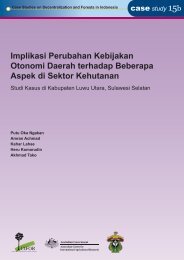Adaptive collaborative management of community forests in Asia ...
Adaptive collaborative management of community forests in Asia ...
Adaptive collaborative management of community forests in Asia ...
Create successful ePaper yourself
Turn your PDF publications into a flip-book with our unique Google optimized e-Paper software.
Chapter 3: <strong>Adaptive</strong>ness and Collaboration <strong>in</strong> Community Forestry <strong>in</strong> Nepal • 53<br />
This chapter highlights the experiences and lessons <strong>of</strong> an <strong>in</strong>novative<br />
participatory action research (PAR) project <strong>of</strong> the Center for International<br />
Forestry Research (CIFOR) and the Nepal M<strong>in</strong>istry <strong>of</strong> Forests and Soil<br />
Conservation, with fund<strong>in</strong>g from the <strong>Asia</strong>n Development Bank (ADB).<br />
Known as the <strong>Adaptive</strong> Collaborative Management <strong>of</strong> Community Forests<br />
project, it was implemented from 1999 to 2002. The project sought to<br />
enhance equity, susta<strong>in</strong>ability and livelihoods <strong>in</strong> <strong>community</strong> forestry by<br />
identify<strong>in</strong>g, develop<strong>in</strong>g and critically assess<strong>in</strong>g <strong>in</strong>stitutional arrangements,<br />
processes and other factors to enhance <strong>community</strong> forest governance<br />
and <strong>management</strong>, especially at level <strong>of</strong> the <strong>community</strong> forest user group<br />
(CFUG). Because <strong>of</strong> the complex and dynamic nature <strong>of</strong> the <strong>community</strong><br />
forest context, the <strong>in</strong>novations that were generated and assessed dur<strong>in</strong>g this<br />
project were based <strong>in</strong> adaptive and <strong>collaborative</strong> <strong>management</strong> (ACM).<br />
The ACM approach to governance and <strong>management</strong> blends ideas <strong>of</strong><br />
communication, relations and social learn<strong>in</strong>g amongst a diverse range <strong>of</strong><br />
actors. At its core, the approach <strong>in</strong>tegrates two related themes: adaptive<br />
<strong>management</strong> and <strong>collaborative</strong> <strong>in</strong>teraction amongst actors. The adaptive<br />
<strong>management</strong> aspect emphasises that all <strong>management</strong> and governance can<br />
be an opportunity for learn<strong>in</strong>g and cont<strong>in</strong>ual adjustment and improvement<br />
<strong>in</strong> generat<strong>in</strong>g knowledge and tak<strong>in</strong>g action <strong>in</strong> the field. As Lee (1993:<br />
9) suggests, ‘all policies are experiments—learn from them’. <strong>Adaptive</strong><br />
<strong>management</strong> is especially important <strong>in</strong> dynamic and complex contexts that<br />
require responsive <strong>management</strong>. The concept <strong>of</strong> collaboration 2 —far from<br />
a naïve presupposition <strong>of</strong> constant cooperation—can be used as a w<strong>in</strong>dow<br />
for <strong>in</strong>sights <strong>in</strong>to the effective and synergistic ‘bound<strong>in</strong>g <strong>of</strong> conflict’ that<br />
takes place <strong>in</strong> successful natural resource <strong>management</strong> and governance<br />
(Ojha et al. 2003). An ACM approach creates space for groups to negotiate<br />
their <strong>in</strong>evitably diverse <strong>in</strong>terests and unequal power relations as they make<br />
and implement natural resource decisions over the long term. Although it<br />
recognises differences and disparities, ACM also stresses opportunities to<br />
form <strong>collaborative</strong> (and more equitable) relationships among the actors.<br />
In fact, <strong>in</strong> an ACM approach, conflict is seen as unavoidable and even<br />
a constructive part <strong>of</strong> transformation towards cooperation. Conflict and<br />
cooperation are potentially l<strong>in</strong>ked through the l<strong>in</strong>chp<strong>in</strong> <strong>of</strong> social learn<strong>in</strong>g 3<br />
processes.<br />
The experiences <strong>of</strong> this <strong>in</strong>itial project were powerful for researchers and<br />
forest user group members alike, and they provide important foundational<br />
lessons. Follow<strong>in</strong>g the ACM project, CIFOR and Nepali research<br />
partners Forest Action and NewERA and others 4 built on these lessons
















